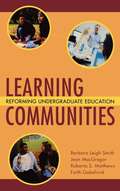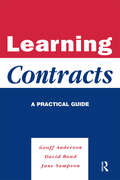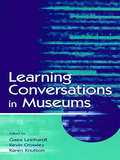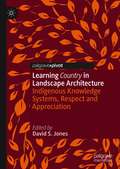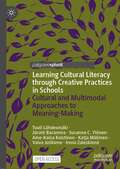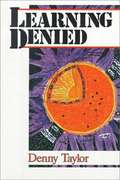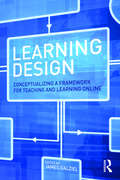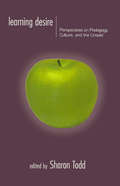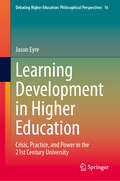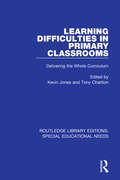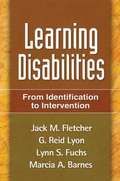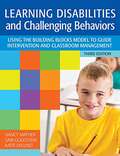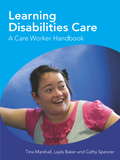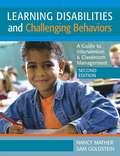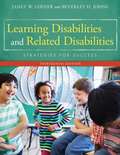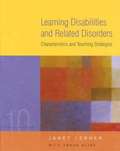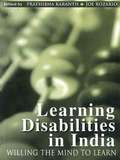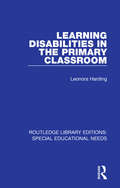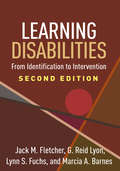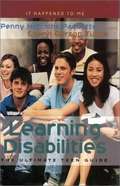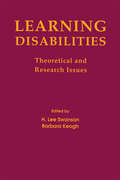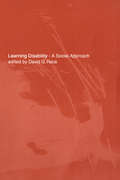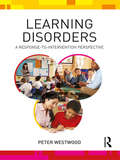- Table View
- List View
Learning Communities: Reforming Undergraduate Education
by Jean MacGregor Barbara Leigh Smith Roberta Matthews Faith GabelnickLearning Communities is a groundbreaking book that shows how learning communities (LCs) can be a flexible and effective approach to enhancing student learning, promoting curricular coherence, and revitalizing faculty. Written by Barbara Leigh Smith, Jean MacGregor, Roberta S. Matthews, and Faith Gabelnick¾acclaimed national leaders in the learning communities movement¾this important book provides the historical, conceptual, and philosophical context for LCs and clearly demonstrates that they can be a key element in institutional transformation.
Learning Contracts: A Practical Guide
by Boud, David Anderson, Geoff Sampson, JaneLearning contracts have been a successful feature of many university/continuing education programmes over the last 20 years but many staff are still unfamiliar with them or have difficulty using them. This guide introduces the learning contract to those considering using them on their courses.
Learning Conversations in Museums
by Gaea Leinhardt Kevin Crowley Karen KnutsonWhat do people learn from visiting museums and how do they learn it? The editors approach this question by focusing on conversations as both the process and the outcome of museum learning. People do not come to museums to talk, but they often do talk. This talk can drift from discussions of managing the visit, to remembrances of family members and friends not present, to close analyses of particular objects or displays. This volume explores how these conversations reflect and change a visitor's identity, discipline-specific knowledge, and engagement with an informal learning environment that has been purposefully constructed by an almost invisible community of designers, planners, and educators. Fitting nicely into a small but rapidly expanding market, this book presents: *one of the first theoretically grounded set of studies on museum learning; *an explicit presentation of innovative and rich methodologies on learning in museums; *information on a variety of museums and subject matter; *a study on exhibitions, ranging from art to science content; *authors from the museum and the academic world; *a range of methods--from the analysis of diaries written to record museum visits, to studies of preservice teachers using pre- and post-museum visit tests; *an examination of visitors ranging from age 4-75 years of age, and from known and unknown sample populations; and *a lens that examines museum visits in a fine grained (1 second) or big picture (week, year long) way.
Learning Country in Landscape Architecture: Indigenous Knowledge Systems, Respect and Appreciation
by David S. JonesThis book strategically focuses upon the feasibility of positioning Indigenous Knowledge Systems into tertiary built environment education and research in Australia. Australian tertiary education has little engaged with Indigenous peoples and their Indigenous Knowledge Systems, and the respectful translation of their Indigenous Knowledge Systems into tertiary education learning. In contrast, while there has been a dearth of discussion and research on this topic pertaining to the tertiary sector, the secondary school sector has passionately pursued this topic. There is an uneasiness by the tertiary sector to engage in this realm, overwhelmed already by the imperatives of the Commonwealth’s ‘Closing the Gap’ initiative to advance Aboriginal and Torres Strait Islander tertiary education successes and appointments of Indigenous academics. As a consequence, the teaching of Indigenous Knowledge Systems relevant to professional disciplines, particularly landscape architecture where it is most apt, is overlooked and similarly little addressed in the relevant professional institute education accreditation standards.
Learning Cultural Literacy through Creative Practices in Schools: Cultural and Multimodal Approaches to Meaning-Making
by Tuuli Lähdesmäki Katja Mäkinen Aino-Kaisa Koistinen Susanne C. Ylönen Jūratė Baranova Vaiva Juškiene Irena ZaleskieneThis open access book discusses how cultural literacy can be taught and learned through creative practices. It approaches cultural literacy as a dialogic social process based on learning and gaining knowledge through emphatic, tolerant, and inclusive interaction. The book focuses on meaning-making in children and young people’s visual and multimodal artefacts created by students aged 5–15 as an outcome of the Cultural Literacy Learning Programme implemented in schools in Cyprus, Germany, Israel, Lithuania, Spain, Portugal, and the UK. The lessons in the program address different social and cultural themes, ranging from one’s cultural attachments to being part of a community and engaging more broadly in society. The artefacts are explored through data-driven content analysis and self-reflexive and collaborative interpretation and discussed through multimodality and a sociocultural approach to children’s visual expression. This interdisciplinary volume draws on cultural studies, communication studies, art education, and educational sciences.
Learning Curve
by Sara Raziel Ilana PollackBrilliant Yehudis Tannenbaum aces her courses and is the class genius, pestered for help before every test. But is her brain all that anyone can see in her - even her good friend, Tova? Tormented by the English teacher's spelling mistakes and her own inexplicable difficulty with geometry, Yehudis stumbles through her first year in high school in the attempt to just fit in. It doesn't help that her lack of theatrical talent for the school play lands her in the costume department, and incredibly ends up getting her suspended from school! Learning Curve is a novel of self-awareness and friendship that will entertain as it captivates all the way to its surprising conclusion.
Learning Denied
by Denny TaylorLearning Denied is a powerful document. Denny Taylor's conclusions confirm many teachers' doubts about America's mania for standardized tests, and serve as a signal to teachers and administrators that a reliance on test results can be more than misleading; it can be a hazard to the child.
Learning Design: Conceptualizing a Framework for Teaching and Learning Online
by James DalzielThe new field of learning design has the potential to revolutionize not only technology in education, but the whole field of teaching and learning through the application of design thinking to education. Learning Design looks inside the "black box" of pedagogy to understand what teachers and learners do together, and how the best teaching ideas can be shared on a global scale. Learning design supports all pedagogical approaches, content areas, and fields of education. The book opens with a new synthesis of the field of learning design and its place in educational theory and practice, and goes on to explore the implications of learning design for many areas of education—both practical and theoretical—in a series of chapters by Larnaca Declaration authors and other international experts.
Learning Desire: Perspectives on Pedagogy, Culture, and the Unsaid
by Sharon ToddFirst Published in 1998. Routledge is an imprint of Taylor & Francis, an informa company.
Learning Development in Higher Education: Crisis, Practice, and Power in the 21st Century University (Debating Higher Education: Philosophical Perspectives #16)
by Jason EyreThis book examines the experiences of Learning Development as a pedagogic practice in higher education. Taking a philosophical approach, the book uses the perspective of a fictionalised Learning Developer to investigate the nature of power relations within the university, and how and why they lead to an ongoing sense of 'crisis' in higher education teaching practice. Although Learning Developers and other teachers in higher education are subject to the constraints of power relations within the academy, they are not powerless. By comprehending the nature of these relations and their consequences, the practitioner can begin to formulate new responses and forge new relations. The book provides a theoretical contribution to the emergent profession of Learning Development, and insights into the pedagogic practices of related professional disciplines, including librarians and academic developers. The book will benefit educational researchers and anyone engaged directly in teaching and learning in a university setting. It is also beneficial to those that work alongside them, including senior managers and administrators. The way the philosophical ideas in the book are developed and applied will also be of interest to scholars of Deleuze and philosophers of education.
Learning Difficulties in Primary Classrooms: Delivering the Whole Curriculum (Routledge Library Editions: Special Educational Needs #33)
by Kevin Jones Tony CharltonFirst published in 1992. This book offers clear, practical guidelines to help ensure that the full breadth of the curriculum is made as available to children with special educational needs as the rest of their peers. The book focuses on primary and middle schools and is directed towards the professional training needs and general interests of teachers and support staff, headteachers, governors and parents.
Learning Disabilities
by G. Reid Lyon Jack FletcherEvidence based and comprehensive, this important work offers a new approach to understanding and intervening with students with learning disabilities. The authors--leading experts in neuropsychology and special education--present a unique model of learning disabilities that integrates the cognitive, neural, genetic, and contextual factors associated with these disorders. The volume addresses classification, assessment, and intervention for a range of disabilities involved in reading, mathematics, and written expression. With a focus on exploring the evolving scientific base of the field, as well as establishing effective educational practices, this book will serve as an essential text and an indispensable resource for school psychologists, neuropsychologists, special educators, and others who work with struggling learners.
Learning Disabilities And Challenging Behaviors: A Guide To Intervention And Classroom Management, Third Edition
by Sam Goldstein Ph. D. Nancy Mather Katie EklundWhy do students in Grades K–12 struggle with social and academic skills, and how can teachers help them develop the competence and confidence they need to succeed? Get practical answers in the new edition of this bestselling book, a staple of teacher training since 2001. It's structured like the popular previous editions: a detailed questionnaire pinpoints each student's individual strengths and needs, and an updated version of the highly effective Building Blocks model helps educators target 12 school success factors with proven strategies and guidelines they can use right away. Reliable, up-to-date research makes this a perfect preservice textbook, and the classroom-ready strategies are a lifeline for in-service teachers as they work toward better outcomes for struggling students.
Learning Disabilities Care A Care Worker Handbook
by Tina Marshall Layla BakerWorking with people with Learning Disabilities? Training in Learning Disabilities care? You don't have to go it alone!Caring for people with Learning Disabilities is one of the most challenging and rewarding roles in Health and Social Care. But with a range of awards, certificates and pathways available to work-based learners it can be a confusing area. That's why we've put together a one-stop handbook to support your training and continuing professional development in caring for people with learning disabilities.Here in one place is all the topic knowledge, assessment support and practical advice you will need for a range of learning disabilities qualifications. Core topics are linked to the specific learning and assessment objectives you need to cover for up to 22 QCF units. Case studies tie learning into the many different situations and roles across Home Care, Residential Care, NHS and Private Settings.This book is especially useful for candidates taking the: Level 2 Award in Learning Disabilities Level 2 Certificate in Learning Disabilities Level 3 Award in Learning Disabilities Level 3 Certificate in Learning DisabilitiesIt's also a must have reference for those who want to brush up skills and knowledge from previous qualifications.So whatever your level of specialism, give yourself the tools you need to survive and support your clients with learning disabilities.
Learning Disabilities and Challenging Behaviors: A Guide to Intervention and Classroom Management (Second Edition)
by Sam Goldstein Nancy MatherTwo reasons educators want to implement this book's Building Blocks model in their classroom: They'll have an innovative framework to help them understand the reasons why students in K-12 struggle. They'll have the proven strategies to help students learn. The Building Blocks model is practical, supported by research, and easy to implement. It identifies ten areas important to school success (the building blocks), divided into three levels: the foundational level includes attention and impulse control, emotion and behavior, self-esteem, and learning environment blocks the symbolic processing and memory level contains the visual, auditory, and motor skills blocks the conceptual level comprises using strategies and thinking with language and images A detailed questionnaire for each block helps identify a student's strengths and limitations, cultivate their strengths, address the weaker areas, and develop appropriate accommodations and instructional interventions. Each chapter contains proven teacher strategies to give educators direct information to meet students' individual needs. Once educators understand the causes of students' classroom challenges, educators can design individualized and effective interventions.
Learning Disabilities and Related Disabilities: Strategies for Success (Thirteenth Edition)
by Janet W. Lerner Beverley JohnsThe text that set the standard for students working toward certification in special education has been revised and updated to meet the needs of a new generation of teachers and students. Written for undergraduate and graduate students who are majoring in general education or special education, the book features a cross-categorical emphasis that makes it suitable for a broad number of courses-including those aimed at teaching students with related disabilities and those teaching students on the Autism Spectrum. The authors describe the characteristics of learning disabilities as well as other disabilities, and offer practical teaching strategies for general education teachers, special education teachers, school psychologists, administrators, and related professionals. Pre-service and in-service classroom teachers, who are increasingly responsible for teaching students with special needs within general education or inclusive classrooms, will find LEARNING DISABILITIES AND RELATED DISABILITIES: STRATEGIES FOR SUCCESS, 13th Edition, especially helpful.
Learning Disabilities and Related Disorders: Characteristics and Teaching Strategies
by Janet W. Lerner Frank KlineDesigned to help pre-service teachers and practicing professionals evaluate and aid students with disabilities, this comprehensive text is guided by three main principles: to aid in the assessment and evaluation of students with learning disabilities, to demonstrate Learning Disabled (LD) theory and its practical applications through the use of case studies, and to provide the most up-to-date information on recent developments and topics of debate in the field. The Tenth Edition continues to stress familiarity with state and national standards, specifically those from the Council for Exceptional Children (CEC).
Learning Disabilities in India
by Joe Rozario Pratibha KaranthThis important volume, perhaps the first of its kind in India, brings together professionals from diverse fields who share their experiences of tackling the problem of Learning Disabilities (LD) in India. Highlighting the nuances and specificities of learning disabilities and disorders in the Indian context, the contributors cover a wide range of important issues, including: - the neurological, psychiatric and neuropsychological aspects of LD - problems of language and reading acquisition in the bilingual and multilingual situation prevailing in India - issues of identification and assessment - speech and hearing issues, especially central auditory processing disorders and language deficits The contributors also discuss the changing nature of the needs of children with LD, suggest remedies like primary prevention, stress the importance of integrating affected children in mainstream schools and argue for the need to create awareness about learning disorders.
Learning Disabilities in the Primary Classroom (Routledge Library Editions: Special Educational Needs #30)
by Leonora HardingFirst published in 1986. This book is concerned with the problems children have in learning in normal or remedial classrooms, within ordinary primary schools. It deals with children in the 5 to 11 age range but much is also applicable to children at the lower end of the secondary school. It looks at a wide range of difficulties and for each area it classifies and describes the difficulties, considers the numbers of children with the difficulty; and discusses problems of diagnosis and remediation. It reviews certain psychological theories and research findings and relates them to practice; and it describes the work of professionals such as speech therapists, showing how the classroom teacher can support such professionals; but the major concern of the book is to help practicing teachers and teachers in training to work out intelligently for themselves how to improve their performance in this area.
Learning Disabilities, Second Edition: From Identification to Intervention
by Marcia A. Barnes G. Reid Lyon Jack M. Fletcher Lynn S. FuchsReviewing the state of the science of learning disabilities (LDs) and describing effective educational practices, this authoritative volume has been significantly revised and expanded with more than 70% new material. Foremost LD experts identify effective principles of assessment and instruction within the framework of multi-tiered systems of support (MTSS). With a focus on what works in the classroom, the book explores the full range of reading, mathematics, and writing disabilities. It synthesizes knowledge from neuropsychology, cognitive neuroscience, and special and general education. Illustrations include eight color plates. As a special supplement, a chapter on the history of the LD field from the first edition is provided at the companion website. New to This Edition *Heightened emphasis on intervention, including significant new developments in reading comprehension and math. *Reflects major scientific advances in understanding LDs. *Chapter on principles of effective instruction and MTSS. *Chapter on automaticity in reading, math, and writing. *Chapter on challenges in real-world implementation of evidence-based practices. *Chapter on the validity of the LD construct.
Learning Disabilities: Educational Principles and Practices
by Doris J. Johnson Helmer R. MyklebustFocuses on practical solutions to educational problems involving spoken language, reading, writing, arithmetic, & nonverbal disorders, making this book a timeless reference for all who desire a thorough understanding of learning.
Learning Disabilities: The Ultimate Teen Guide
by Penny Hutchins Paquette Cheryl Gerson TuttleWritten for adolescents confronting learning disabilities, this book provides an overview of the most common disabilities and offers advice on overcoming the difficulties associated with them. Medical aspects of the disabilities are covered and celebrities with similar conditions are profiled. Assistive technology is described, and advice is offered concerning advocacy. Paquette is an educational writer; Tuttle is a special education coordinator. Annotation (c)2003 Book News, Inc., Portland, OR (booknews.com)
Learning Disabilities: Theoretical and Research Issues
by H. Lee Swanson Barbara KeoghThis volume has been developed as a direct result of a conference sponsored by the International Academy for Research in Learning Disabilities, held at the University of California at Los Angeles. The text provides a review and critique of current research in the areas of intelligence, social cognition, achievement, and subtyping as they relate to learning disabilities. In addition, the concept that social behavior is an aspect of intelligence and the relationship between language and reading are discussed in detail by noted experts.
Learning Disability: A Social approach
by David G. RaceThe detailed study of learning disability features rarely in university courses. To a large extent this reflects the low value attributed by our society and its human services to people with learning difficulties. This unusual book, based on one of those rare courses, includes contributions from academic specialists, students and people with learning difficulties, all of whom have participated in the course. Its 'social approach' challenges the very idea of what should be taught about the subject of learning disability and who should teach it. Learning Disability - A Social Approach looks at how people's lives are affected by human services. It covers specific policy and service issues, different aspects of working with people and key debates. The unique insights gained from the combination of academic knowledge and real life experience make it a topical and thought-provoking text for anyone involved with learning disability - student, teacher, professional or policy maker.
Learning Disorders: A Response-to-Intervention Perspective
by Peter WestwoodWhat are learning disorders? How can schools endeavour to address these disorders in today’s inclusive classrooms? This book answers these important questions in practical terms and discusses in detail the instructional needs of students with dyslexia, dysgraphia, dyscalculia, dyspraxia and other significant disorders that affect learning. Peter Westwood draws on international research literature to provide supporting evidence of best practices. The book is unique in linking the teaching methods recommended for overcoming learning problems directly to each of the three tiers of support in the Response-to-Intervention Model. It presents examples of effective whole-class teaching, intensive small group instruction and individual tutoring, as well as addressing key topics such as: educational progress of students with learning disorders; principles for teaching dyslexic students; difficulties with writing and spelling; developing students’ numeracy skills; specific intervention strategies; nonverbal learning disabilities. Learning Disorders will be of interest to practising teachers, trainee teachers, teaching assistants, educational psychologists, school counsellors and parents. It will also provide valuable insights for any school planning to upgrade its support system for students with special educational needs.
